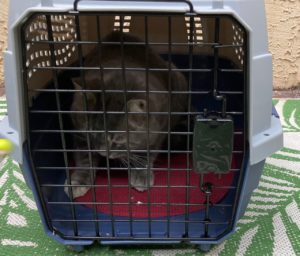 Many of us (cat owners) dread taking our cat to the vet. There is the ordeal of the carrier and car trip; once there, your cat seems miserable. However, regular veterinary care is the key to a happy and longer life for your cat. Can medication before your cat’s vet visit help?
Many of us (cat owners) dread taking our cat to the vet. There is the ordeal of the carrier and car trip; once there, your cat seems miserable. However, regular veterinary care is the key to a happy and longer life for your cat. Can medication before your cat’s vet visit help?
Not every cat needs medication at the vet. Some cats are fine just having some familiar things with them. Familiarity can help reduce situational anxiety – the anxiety you experience when you are in a strange place. Things we can do to increase familiarity for your cat at the vet visit include:
- Training her to be comfortable in her carrier
- Choosing a carrier with a removable top to allow examination in her carrier
- Getting her used to the car and taking her on some drives that don’t end up at the vet
- Bringing your cat’s favorite treats
- Spraying the carrier with pheromones (Feliway) before the visit
For some cats, this may not be enough. Your usually nice kitty becomes a raging demon or just freezes like a rock and doesn’t move – both reactions can be the result of anxiety and fear.
I recently took my youngest cat in a for a rabies vaccine and to have a tooth evaluated. Gus accepted handling and food but had a whopping heart rate of 230 beats per minute! He was anxious even though I was there with him.
We would like our cats to associate good things with going to the vet but they may not be feeling well when they are there or they anticipate getting poked with a needle for vaccinations or blood tests. So, when the carrier comes out, your cat may associate it with negative emotions and understandably becomes anxious.
Anxiety actually has a function in our lives – worrying about something in the bushes pouncing on you probably saved a lot of cavemen and feral cats; anxiety can improve your physical and mental performance. But anxiety at the vet clinic does not benefit your cat and can actually make things worse. An unpleasant visit can become an unpleasant memory.
Medication before your cat’s vet visit
Have you ever had elevated blood pressure at a doctor visit? Anxiety before medical appointments is common for people as well as cats. Because cats don’t speak human language, we can’t reassure them and let them know exactly what is happening. It is worth considering medication before your cat’s vet visit to help reduce his anxiety.
Gabapentin and trazodone are two medications commonly used to reduce the stress of the vet visit. These medications must be prescribed by your veterinarian.
Gabapentin
- Developed as an anti-convulsant
- Has anti-anxiety properties – reduces the release of excitatory neurotransmitters
- Is a pain reliever
Gabapentin is commonly used in the veterinary practice to reduce anxiety in cats. There have been a few studies evaluating fear and stress in cats having taken gabapentin – these studies found a reduced CSS (cat stress score) after administration of gabapentin.
The typical dose is 100 mg given 1.5 – 2 hours prior to the vet visit. Frequently, a dose is also given the night before. Doses can vary for individual cats – some cats may do well with a 50 mg dose while others may need 150 mg.
Gabapentin is available in capsules, liquid and small tablets.
- Capsules: The capsule is opened and the powder is mixed in a small amount of tuna fish or canned cat food. Gabapentin is bitter and some cats may not eat it in food. The capsules may also be given using a pet piller or a squeeze up treat.
- Liquid: The liquid may result in foaming at the mouth.
- Tablets: Gabapentin can also be compounded into small, flavored tablets – these can be given in pill treats.
Your cat may be a little sleepy or wobbly after taking gabapentin. You may want to watch kitty near the stairs or jumping up on things!
Gabapentin is a pain reliever for cats – reducing pain may be one of the ways it helps reduce anxiety and fear
Trazodone
- Antidepressant that is commonly prescribed for insomnia and depression in humans
- One of its side effects is drowsiness
There have been a few studies looking at cats receiving trazodone. One study in particular found that the CSS (cat stress score) was the same in the treated group as the group receiving the placebo. So, trazodone appears to be more of a sedative (makes you sleepy) than an anti-anxiety drug.
Typical dose is 50 mg given by mouth 90 minutes before the stressful event.
- Can result in lower blood pressure in cats
- There is a risk of serotonin syndrome if used with other anti-depressant medication such as fluoxetine (Reconcile).
- Available as a tablet or can be compounded into a liquid or capsule form.
There is increased interest in identifying medications to reduce stress and anxiety in cats at veterinary visits. We should expect to see more medications becoming available in the near future.
Medication before your cat’s vet visit can be part of a low-stress veterinary visit. However, it will be most effective when combined with training to reduce situational anxiety and low-stress handling techniques.
As for Gus, I will make sure to give him some gabapentin before vet visits.

